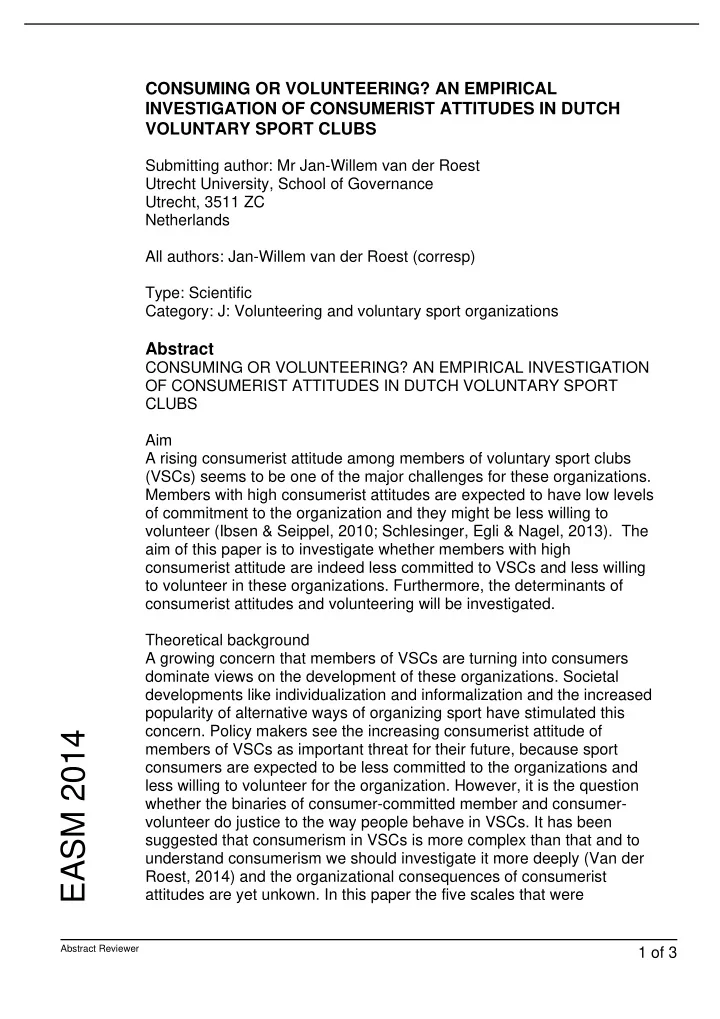

CONSUMING OR VOLUNTEERING? AN EMPIRICAL INVESTIGATION OF CONSUMERIST ATTITUDES IN DUTCH VOLUNTARY SPORT CLUBS Submitting author: Mr Jan-Willem van der Roest Utrecht University, School of Governance Utrecht, 3511 ZC Netherlands All authors: Jan-Willem van der Roest (corresp) Type: Scientific Category: J: Volunteering and voluntary sport organizations Abstract CONSUMING OR VOLUNTEERING? AN EMPIRICAL INVESTIGATION OF CONSUMERIST ATTITUDES IN DUTCH VOLUNTARY SPORT CLUBS� � Aim� A rising consumerist attitude among members of voluntary sport clubs (VSCs) seems to be one of the major challenges for these organizations. Members with high consumerist attitudes are expected to have low levels of commitment to the organization and they might be less willing to volunteer (Ibsen & Seippel, 2010; Schlesinger, Egli & Nagel, 2013). The aim of this paper is to investigate whether members with high consumerist attitude are indeed less committed to VSCs and less willing to volunteer in these organizations. Furthermore, the determinants of consumerist attitudes and volunteering will be investigated.� � Theoretical background� A growing concern that members of VSCs are turning into consumers dominate views on the development of these organizations. Societal developments like individualization and informalization and the increased popularity of alternative ways of organizing sport have stimulated this concern. Policy makers see the increasing consumerist attitude of EASM 2014 members of VSCs as important threat for their future, because sport consumers are expected to be less committed to the organizations and less willing to volunteer for the organization. However, it is the question whether the binaries of consumer-committed member and consumer- volunteer do justice to the way people behave in VSCs. It has been suggested that consumerism in VSCs is more complex than that and to understand consumerism we should investigate it more deeply (Van der Roest, 2014) and the organizational consequences of consumerist attitudes are yet unkown. In this paper the five scales that were Abstract Reviewer 1 of 3
developed by Van der Roest (2014) will be used in order to understand consumerist attitudes in VSCs. These concepts are independence, responsibility, sociability, quality and exit. In order to understand how organizational commitment influences volunteering in VSCs, the organizational commitment questionnaire (Meyer, Allen & Smith, 1993) was used. Cuskelly, Boag and McIntyre (1999) and Engelberg, Zakus, Skinner and Campbell (2012) have shown that affective and normative commitment can be good predictors for volunteering.� � Methods� An online questionnaire was distributed among members of ten voluntary sport clubs in five sports (golf, football, korfball, tennis and volleyball). These clubs were purposely selected because they either had the characteristics of a modern VSC or a traditional VSC, for each sport a modern and a traditional club was selected. The clubs were asked to send out an e-mail and one reminder to all members above 15 years (total of 2,974 members) with an e-mail address. Members who were interested filled out the questionnaire, yielding a total of 803 respondents (response rate: 27,0%). It should be recorded, though, that there is a selection bias in this study. It is probable that members who have the highest consumerist attitudes are not interested in a questionnaire regarding consumerism and commitment in the VSC. This should be kept in mind in the analysis and the interpretation of the data. All scores in the consumerism scale were recoded to measure consumerism, which means that a high score on the sociability factor resembles a low attitude towards sociability in a sports organization� � Results� The first results indicate that affective commitment is negatively correlated with independence, responsibility, sociability and exit. Normative commitment is negatively correlated with all consumerism scales. The number of hours volunteering in the VSC is negatively correlated with responsibility, sociability and exit. Full results will be ready for presentation at the EASM Conference. References Cuskelly, G., Boag, A., & McIntyre, N. (1999). Differences in organizational commitment between paid and�volunteer administrators in EASM 2014 sport. European Journal for Sport Management, 6, 39–61.� Engelberg, T., Zakus, D.H., Skinner, J.L. & Campbell, A. (2012) Defining and Measuring Dimensionality and�Targets of the Commitment of Sport Volunteers. Journal of Sport Management, 26 (2), 192-205. � Ibsen, B. & Seippel, Ø. (2010). Voluntary organized sport in Denmark and Norway. Sport in Society, 13 (4),�593-608.� Meyer, J.P., Allen, J.A. & Smith, C.A. (1993). Commitment to organizations and occupations: Extension and�test of a three-component conceptualization. Journal of Applied Psychology, 78, 538-551. � Abstract Reviewer 2 of 3
Schlesinger, T., Egli, B. & Nagel, S. (2013).‘Continue or terminate?’ Determinants of long-term volunteering in�sports clubs. European Sport Management Quarterly, 13 (1), 32-53.� Van der Roest, J. (2014) Conceptualising and Constructing a Research Scale for Consumerism in Sports�Organisations. Unpublished manuscript. EASM 2014 Abstract Reviewer 3 of 3
Recommend
More recommend